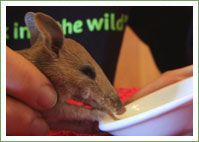Long-nosed Bandicoot
Wednesday, September 7, 2011

A tiny, juvenile bandicoot was rescued in Kenthurst where she had been found in a humane rabbit trap with her mother and two other joeys. The mother and babies were released from the trap by the resident but as two of the baby marsupials scampered off into the bush with their mum, this young female was left behind.
The concerned Kenthurst residents then dropped off the remaining joey to their local vet at Kellyville where it was picked up by Steve, one of our volunteers.
The female long-nosed bandicoot, weighed just 60g and was estimated to be between 45 and 50 days old when found.
Steve took the rescued joey back to his Dural property.
Since her rescue she has been thriving on a healthy bandicoot diet and should be released back in Kenthurst in a few weeks time when she is able to fend for herself.
About the size of a small rabbit, the Long-nosed Bandicoot has pointed ears, a short tail, grey-brown fur and, of course, a long nose. The gestation period of only 12.5 days is one of the shortest known of any mammal.
Long-nosed Bandicoots are about the size of a small rabbit and were once widespread and common in Sydney. Their range and distribution in the Sydney region is now greatly reduced, and only isolated populations remain in bushland areas to the north and south of Sydney. At Manly there is a small colony that has been classified as an 'endangered population'.
Long-nosed Bandicoots live in forests and woodlands, and heath and feed on insects and other small invertebrates.
The Long-nosed Bandicoot is probably best known for the small, round conical holes it leaves behind as it forages at night. These holes are dug with the front feet and are big enough for the animal's long, sensitive snout to reach in and detect insects. During the day they sleep in nests made from grasses and other plant material.
Recent Posts
WIRES launches its first wildlife rehabilitation centre - Mullyang
WIRES Emergency Response in the wake of ex-tropical cyclone Alfred
International Women’s Day Volunteer Spotlight: Shelley
Tropical Cyclone Alfred – Emergency Wildlife Advice
Interview with WIRES Training and Development
Celebrating Women in Science: The Journey of Holly, Wildlife Conservationist and WIRES Team Member
